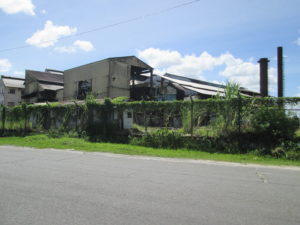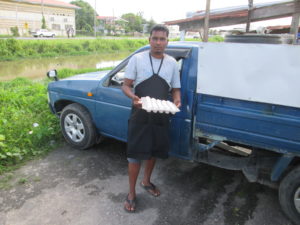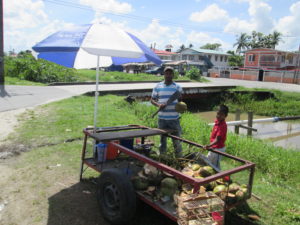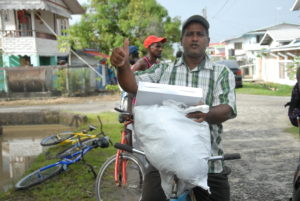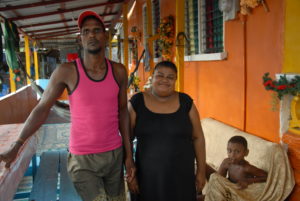Sunday Times Magazine ‘Persons of the Year’ The Wales Estate Sugar Workers
By Shemuel Fanfair
The end of 2017 saw an uncertain future for thousands of men and women across the sugar belt with the retrenchment of their employment, but as they begin to contemplate what lies ahead, a suitable marker can be taken from the challenges that have befallen the workers formerly attached to the Wales Sugar Estate.
December 31, 2016 was the official date for the cessation of operations at the century old entity. While the circumstances that led to closure of the Estate were principally financial, what holds true is that the lives of thousands of workers, their families and surrounding business owners were catastrophically altered with the end of the main sustenance to the Wales and further West Bank area. It is against this backdrop that Sunday Times Magazine selected Wales workers as the main ‘Persons of the Year 2017’ as no other group of persons in recent times in Guyana have gone through the magnitude of challenges as they have faced, and remain unbowed.
It was unfortunately observed within the past year that workers remain without being paid their severance benefits and have encountered financial challenges since the closure. But what became of the many workers who did receive the one-off payment? Are they surviving? Can they properly provide for themselves and families? These are some of the many questions this publication asked in recent interviews with the sugar workers.
What was uncovered in speaking with those who are awaiting severance and the others who have already been paid is that they are both facing a lack of consistent employment, which according to them, is putting great strain on their families.
Sugar worker and father of three, Azad Ally, in low-spirit, expressed that he cannot find steady work. Ally, who had worked for 17 years before he was laid off, noted that while he was able get some work for the holidays, when the season is over his source of income will be completely depleted.
“Only my wife working right now; I feeling real odd right now and is holiday time and I ain’t even bring money in the house to be honest,” Ally revealed.
Many of the workers had utilised their pay-out to purchase motor vehicles, which they used to operate hire car and taxi services. However, many did not foresee that they would have to contend with increased competition and fewer passengers traveling to and from the area due to reduced earnings and a lack of economic opportunities in the Wales area.
Others meanwhile used their severance pay-out to build their homes and complete other housing projects.
One such individual is Deochan Khan who laboured in the No. 1 Planting Gang with some 15 years of service with the Guyana Sugar Corporation (GuySuCo). When this publication caught up with the former employee, he was seen plying his new trade as a coconut water vendor in the blistering sun in the nearby village Patentia, West Bank Demerara. Being a father of five, ages eleven, eight, six, five and four, Khan could not just stay at home and be unproductive. He even tried his hands at masonry. He said that as a coconut water seller he labours for more hours and sometimes makes only GYD$2,000 a day when costs to purchase the coconuts are subtracted.
Just two days before Christmas, Khan only bought gifts for two of his children and remarked that he was doing a “final hustle” to garner enough funds to meet his holiday needs.
Khan remembered earning a good salary from which he was able to save much, but with his spouse being a housewife and the family having less income, all he can hope is for his family to weather this storm.
“Sometimes you got to go internet for assignments for children; one child traveling to Canal No.1 for school; things getting harder; we not getting it easy,” Khan disclosed.
In the past, he would catch fish and shrimps in the backdam to support his income, but he was forced to discontinue this practice as much of the trenches and waterways have become clogged and filled with weeds after the Estate’s closure.
His former colleague Aseer Bacchus shared similar sentiments, noting that he too would “cast nets” as a side job. But after 28 years of service with GuySuCo, the cane cutter and father of five said he has no choice than to seek the support of his three working children, one of whom will soon be laid off the sugar corporation. Sunday Times Magazine visited the Bacchus’ home in Vriesland, another nearby community affected by the Wales Estate closure.
Bacchus’ wife Salima noted the mounting expense of having two children in school: 16-year-old Daniel, who is writing CSEC later this year, and eight-year-old Emmanuel, a primary school student. Salima noted that while her 2017 Christmas was good, she is unsure what will occur in 2018.
“It will be worse because we don’t know if we will get the severance, but we hoping and praying that everything will be okay,” Salima conveyed.
Bacchus mentioned that he has been faced with great difficulty in finding employment.
“We got bills to pay. It rough, but we does try and pray. We don’t know what will happen in years to come. After the severance, we need jobs because what we gonna do… sit and eat it out? When I sit down here, watch over there [at the canfield] I want to cry, because I don’t have a job,” Bacchus stated.
As Bacchus remains somewhat optimistic, another sugar worker Dairam Lachmana is seemingly beyond the depths of despair following the dismantling of his family. He noted that relations soured with his partner. Lachmana, who worked for 10 years before being laid off, claimed that after seven years together, his spouse moved out, along with their only child. He estimated a bleak outlook for 2018 and is still coping with being abandoned by his family.
“Because I’m not getting money to maintain my family, I gave her the child. She left about two months back. I feel real upset, real corrupted right now,” Lachmana said, looking away to the dusty and desolate road at Patentia.
Another worker, who is awaiting severance, told this publication that his wife is currently the principal breadwinner. He divulged that at times of arguments, he is subjected to ridicule where he is reminded of his unemployment status.
Sugar worker Nigel Andres said that he worked 16 years at the now closed Diamond Estate before joining Wales Estate.
“When you looking for work, you’re not getting pay. People owing you. Cane work was the only work we were sure about,” the father and grandfather noted.
Former Tug Captain, Gordon Thomas highlighted the difficulties that sugar workers faced in the past year.
“2016 was bad and 2017 made it worse because people are not earning. People expected to get their severance… no increase for 2016 and 2017; how do you expect the people to survive?” Thomas asked.
Pensioner Albert Vieira, 61, said he received his pension the same year that the Estate ended operations. He noted that the closure, as predicted, has seen wide-reaching effects in the surrounding communities.
“The people not getting work; plenty of them went fisheries, they worked two morning because they had market… now the market suspend, they at home, they not getting jobs. Work not circulating, money not circulating, we don’t have any factory that the people could go and work,” Vieira said.
He recalled that he was able to build his life from the earnings he obtained from the Estate, having worked there over 40 years ago.
The workers’ union, the Guyana Agricultural and General Workers’ Union (GAWU), having observed the financial challenges, collaborated with several entities to distribute food hampers to the Estate workers. The hampers, which were distributed days after Christmas, included rice, peas, flour and sugar.
The Wales Estate closure and the firing of 1700 workers were touted as a cost-saving measure due to billions of dollars that were allocated to the entity and sugar industry as a whole. However, many lower West Bank communities, such as Wales, Bellvue, Good Intent, Sisters, Vriesland, and as far as Vive Le Force, were all impacted from the closure. Additionally, farmers at La Retraite, Bellvue and Canal No. 2 Polder were also affected as they were compelled to transport their cane to Uitvlugt. Nevertheless, the villagers and communities have not given up as many are resilient and have undertaken arduous tasks to ensure that they provide for their families.
